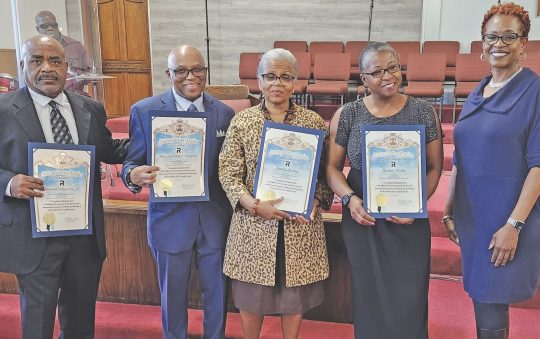An average of 380 out of every 100,000 Black adults became new entrepreneurs during the 2020 pandemic, up from 240 in each of the prior two years, according to U.S. census data.
2020 was also the first year the Greater Los Angeles African American Chamber of Commerce (GLAAACC) increased the number of participants in its Business Evolution Program from one to 13 and held classes virtually. At 35, GLAAACC’s 2021-22 BEP cohort is almost triple the number of participants from the previous year.
The newest cohort comes from a variety of industries: film production, trucking, retail, personal care, real estate management, marketing, janitorial, technology, psychology, environmental and construction. Their time in business also varies greatly: from a first year startup to a family-owned operation that’s been in business for 71 years.
“2020 was a game-changer in many ways,” said GLAAACC Chairman Gene Hale, who launched G & C Corporation, a construction equipment leasing business in 1993. “Many Black people lost their jobs and decided to go for it and become their own boss. Others decided now is the time to take their business to the next level.”
Over the past decade, GLAAACC’s BEP has evolved into a renowned boot camp for serious entrepreneurs. Over the course of nine months, business owners attend classes taught by subject matter experts on business assessment, back-office business set-up and management, business certification, access to capital and to other financial products, Branding & digital marketing, contracting with the government and e-marketing & technology.
At the second virtual meeting in September, the BEP cohort heard from speakers about the role of an entrepreneur, the impact businesses can have on the community and the three stages of business the early, growth and mature.
BEP Chairperson and Director for Supply Chain and Diverse Business Enterprises for Southern California Gas Lily Otieno, spoke about planning for future success in the early years of a business. Having a clear vision, developing a five-year roadmap and getting the proper financing is critical for any new business according to Otieno. Next, hiring staff that have diverse and complementary skill sets and building the appropriate company culture is important. “Hiring people whose strengths are your weaknesses will give you the best team possible” said. Otieno. She also listed process and operations, marketing and sales, networking and having an exit plan as necessary steps to ensure business owners stay on track during the early stages.
Hale recounted a business tip he received from former Los Angeles Mayor Tom Bradley to “get there before the deal is made.” Hale said in the competitive world of construction, he lives by that rule. “You have to get out there and find the business deals before your competitor finds it.”
Rambo House founder, business consultant, advisor and thought leader Dion Rambo spoke to the cohort about the importance of relationships and networking in the growth phase of a business. During the pandemic, Rambo spotted a niche market and opened a mobile telehealth van service. Putting this timely endeavor into operation enabled him to create a multi-million dollar company in less than a year.
Prior to the pandemic, Rambo organized thirty events per year for city officials through his public relations and marketing firm. He said developing key relationships with local officials is underrated, especially in the Black community. “My relationships with public officials is definitely what made my companies grow,” said Rambo.
The meeting’s final speaker was Walter Hill, founder of Icon Blue, a distribution company for branded merchandise and promotional products. Hill recently sold his company and wrote a book for entrepreneurs entitled, “Think Red Flags: A Proactive and Profitable Approach for your Small Business.” Hill cited the ability to mitigate or avoid business pitfalls as crucial to business success and profitability.
“Whatever you’re going to do for your community, you have to first develop a business that is profitable. That is the catalyst that allows you to move forward.” Hill said. “In order to do things for others, we first have to be in position ourselves where we are able to do it.”
GLAAACC’s Business Evolution Program is made possible by T Mobile, Wells Fargo, Southern California Edison, Union Bank, Chase for Business and Southern California Gas.








